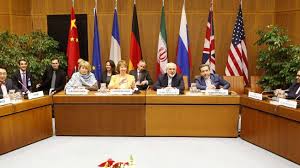ID :
347389
Tue, 11/11/2014 - 12:21
Auther :
Shortlink :
https://oananews.org//node/347389
The shortlink copeid
US faces last best chance on Iran n-deal: Iran Daily

Tehran, Nov 11, IRNA - The Obama administration is facing its last best chance to reach a deal with Iran over its nuclear program — not just to meet an end-of-the-month deadline for a deal, but also to seal one before skeptical Republicans who will control Congress next year are able to scuttle it, underscored the English-language paper 'Iran Daily' published Tuesday.
Elucidating on the second day of talks among US and Irnaian officials in Oman's capital, the daily in its News Analysis column noted that the stakes are high as the November 24 deadline approaches.
A deal would deliver a foreign policy triumph for the White House, which is being hammered by prominent Republican senators over its handling of the civil war in Syria and the growth of the ISIL militancy in Iraq. Those same critics seek to put the brakes on US-Iranian bartering, if not shut it down completely, once they seize the majority on January 3, noted the daily.
Iran, the paper highlighted, has maintained that its nuclear activities are purely peaceful and necessary to fuel medical and energy demands.
Last week, Kerry, a former Senate Foreign Relations committee chairman, rejected suggestions that a GOP-controlled Congress would be able to change course on negotiations with Iran. He also noted that any Senate move would need overwhelming support to be approved. “As we have learned in the last few years, the minority has enormous power to stop things from happening,” he said.
He also has said none of the world powers has an appetite for extending the talks beyond the November 24 deadline, although that remains a remote possibility if an agreement appears close.
If a deal is struck before year’s end, US lawmakers may have limited ability to undo it. Experts believe most of the US penalties against Iran’s financial and oil markets can be suspended, if not lifted entirely, by presidential authority.
Beyond January 3, however, and without an agreement in place, Congress could try to issue new sanctions without giving Obama that authority to suspend or lift them. Already, a plan to strengthen them if the negotiations expire without a final deal has gathered strong backing from senators from both parties.
If both sides are close at that point, the administration almost certainly would move to veto any legislation imposing new penalties, or ones that would otherwise tie Obama’s hands. Administration officials believe new sanctions could violate the negotiating terms and lead Iran to step up its production of enriched uranium. But if the negotiations drag on, the White House will have to decide whether it could accept sanctions with a threatened ‘trigger’ to be enacted in future months.
A senior US official said such triggered sanctions could appease anxious lawmakers, while at the same time push Iran more quickly toward a deal. The US official made clear that triggered sanctions are not currently being considered by the White House. The official was not authorized to discuss the strategy by name and spoke on condition of anonymity.
“If Congress can be convinced that the overall framework for a deal is in place and it really is just loose ends that need tying, then I think it would probably wait until seeing a final deal before taking any action,” said James Acton, co-director of the nuclear policy program at the Carnegie Endowment for International Peace in Washington.
“However, it may be hard to persuade Congress that a deal is just around the corner,” Acton said.
Broadly, a potential agreement would ease economic sanctions against Tehran in exchange for curbing its nuclear activities. It would have to provide international inspectors with verifiable access to Iran’s nuclear facilities.
Iranian officials appear guardedly optimistic about reaching an agreement by the end of November, but insist on a quick lifting of the sanctions.
Iran agreed to freeze its uranium enrichment during the negotiations.
“Sanctions have never contributed to the resolution of this issue,” Zarif told reporters as he headed to Muscat. “They must be removed. They have not produced any positive results.”/end





